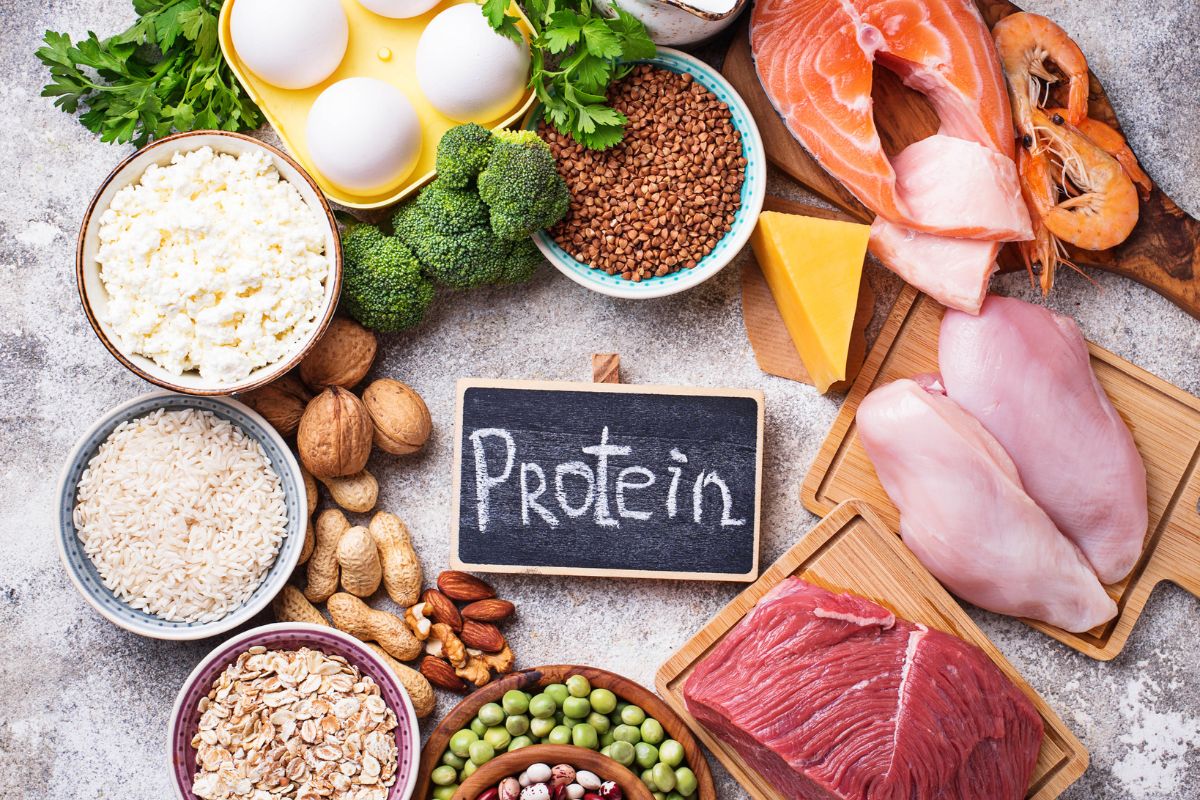Fitness-Friendly High-Protein Snacks

Eating protein-rich snacks between meals can help fuel workouts, build muscle, and curb hunger. High-protein bites slow digestion and keep you feeling full longer, which can aid weight loss and recovery. They also supply amino acids for muscle repair after strength training. Examples include portable foods like jerky, nuts, Greek yogurt, protein bars, and homemade energy bites. By choosing options suitable for your diet – vegan, low-carb, or gluten-free – you can snack smart and support goals like muscle gain, weight control, and endurance.
Benefits for Fitness Goals
-
Muscle Gain: After strength workouts, muscles need protein to rebuild and grow. Consuming a high-protein snack (for example, whey or plant-based protein powder, Greek yogurt, or jerky) within 30–60 minutes post-exercise helps maximize muscle protein synthesis.
-
Weight Loss/Maintenance: Protein is very satiating. A protein-rich snack slows digestion and steadies blood sugar, helping you feel fuller longer and avoid overeating. For example, a small serving of nuts, cheese, or hard-boiled egg can tide you over with fewer calories than a carb-heavy snack. Many dietitians note that pairing protein with fibre and healthy fats (nuts, seeds, avocado) further enhances satiety.
-
Endurance and Energy: Carbohydrates are the primary fuel for endurance exercise, but protein still plays a key role. Protein repairs the muscle wear-and-tear from long training sessions and helps form hemoglobin for oxygen delivery. Having some protein along with carbs (for example, Greek yogurt with fruit or a whey shake) can support sustained energy and recovery during and after long workouts.
Each snack below lists approximate protein and calorie content to illustrate its fitness benefits.
Store-Bought High-Protein Snacks
-
Jerky (beef, turkey, plant-based): Shelf-stable and portable, 1 ounce (28 g) of beef jerky has about 9–10 g of protein and 114 calories. Salmon or chicken jerky can give ~10–12 g per ounce. Jerky is low-carb and typically gluten-free (check labels), making it ideal for low-carb and gluten-free diets. Choose low-sodium versions when possible.
-
Greek Yogurt (plain, nonfat): A 5.3-ounce (150 g) cup provides about 16–17 g protein and 90 calories. It’s gluten-free (if unflavored) and can be low-carb. Add berries or nuts for fiber and flavor. (Vegan alternative: plant-based yogurts made from soy, pea, or coconut; a typical 5-oz soy yoghurt has ~6–8 g protein.)
-
Cottage Cheese: 1/2 cup of low-fat cottage cheese delivers ~12 g protein and ~90 calories. It’s also gluten-free and rich in calcium. Mix with fruit for sweetness or chopped veggies and herbs for a savory snack. (Note: dairy not vegan, but lactose-free versions exist.)
-
String Cheese or Cheese Slices: Common cheese sticks (mozzarella, cheddar) supply about 6–12 g protein per ounce. For example, three slices of American or mozzarella cheese ≈12 g protein, and one stick of string cheese ≈7 g. Cheese is low-carb and gluten-free, though not vegan.
-
Hard-Boiled Eggs: One large egg has 6–6.5 g protein (78 calories). Two eggs (~145 cal) pack ~12–13 g protein. Pre-peeled eggs kept chilled make an easy grab-and-go snack. Suitable for keto and gluten-free diets (not vegan).
-
Nuts and Seeds: Almonds, peanuts, pistachios, and pumpkin seeds are protein-dense vegan snacks. A 1-ounce serving of almonds (~23 nuts) has ~6 g protein, peanuts ~7 g, and pumpkin seeds 8 g per ounce. These are also high in healthy fats and fiber. Keep portions small (a “handful”) since nuts are calorie-dense. Packs of roasted edamame (green soybeans) offer ~9 g per 4 oz (94 cal) and are vegan and gluten-free.
-
Protein Bars and Bites: Look for bars with ≥10 g protein, low sugar, and around 150–200 calories. For example, CLIF Builders Minis (vegan, gluten-free) have 10 g protein in 140 calories. Many protein bars are made from whey or plant protein (soy, pea). Bars labeled “low-carb” or “keto” often use nuts and whey. (Tip: check ingredient list for added sugar and gluten if needed.)
-
Roasted Chickpeas or Legume Snacks: Crunchy roasted chickpeas or lentil chips provide ~6–7 g protein per 1/4–1/2 cup. For instance, 1/2 cup cooked chickpeas has ~7 g protein. Brands like Saffron Road or The Good Bean sell roasted chickpea snacks (20–25 g serving ~120 cal, with ~5–6 g protein). These are vegan and usually gluten-free.
-
Nut-Butter Packets: Single-serving pouches of peanut or almond butter (2 tbsp) contain about 7–8 g protein and ~200 calories. Spread on apple slices, rice cakes (check GF), or dip with veggies. These are vegan, gluten-free, and provide healthy fats for energy.
-
Hummus & Veggies: Hummus (made from chickpeas) has about 2 g protein per 2-tbsp, plus fiber and fat. Pair 1/4 cup hummus (~3–4 g protein, ~100 cal) with carrot sticks or bell pepper slices. This vegan snack is moderate-protein but can be doubled up with whole grain crackers (or gluten-free crackers) for extra carbs if needed.
-
Canned Tuna/Salmon Pouches: A 3-ounce pouch of tuna or salmon yields 18–20 g protein with minimal carbs (100–120 cal). These are gluten-free, shelf-stable (before opening), and excellent for low-carb diets. Mix with mustard or Greek yogurt for creaminess.
-
Edamame: Steamed edamame pods (buy frozen or in-shell soybeans) are vegan and rich in protein (1 cup shelled = 18 g protein). Enjoy hot or chilled with sea salt. These are naturally gluten-free and high in fiber.
Homemade High-Protein Snacks
-
Energy Balls/Protein Bites: Combine nut butter, oats (or oat flour), protein powder (whey or plant), seeds, and a touch of honey. For example, one peanut butter “protein ball” (about 2 tablespoons ingredients) can have ~6–8 g protein (depending on recipe) and ~100 calories. Store in the fridge. These are easily made gluten-free by using GF oats or seeds and can be vegan if using plant-based protein powder.
-
Yogurt Parfait: Layer plain Greek yogurt with berries and high-protein granola or nuts. A 1-cup serving of Greek yogurt (23–24 g protein, ~140 cal) topped with 2 tablespoons of granola (~3 g protein, 60 cal) makes a filling snack (26–27 g protein total). Use coconut or almond “yogurt” to make a vegan version (though protein will be lower, ~3–5 g).
-
Cottage Cheese Bowls: Mix 1/2–3/4 cup cottage cheese (12–18 g protein, 90–140 cal) with pineapple chunks or cherry tomatoes. Add sliced almonds or flaxseeds to boost protein and fiber (2 tbsp almonds ~4 g). Serve in a small container. (Vegan substitute: firm tofu crumbled with herbs can mimic cottage-cheese texture, ~8 g protein per 3 oz tofu.)
-
Egg Muffins: Whisk eggs (6 g protein each) with chopped veggies and cheese or tofu, pour into muffin tin, and bake. One egg muffin (1 large egg plus fillings) yields ~6–8 g protein (~100 cal) and is easy to store. These gluten-free, portable snacks stay good 3–4 days in the fridge. For a vegan take, try chickpea-flour “omelets” or baked tofu bites.
-
Smoothies and Shakes: Blend a scoop of protein powder (20–25 g protein) with milk or a milk alternative, plus fruit or greens. A typical shake (~250 mL) may have 150–200 calories (with mostly protein). These are very portable in a bottle and can be vegan (pea/soy protein) or dairy (whey/casein).
-
Roasted Nuts/Seeds Mix: Toast your own spice mix of almonds, peanuts, sunflower or pumpkin seeds. A 1-ounce homemade mix (~160 cal) yields 6–7 g protein (almonds ~6 g, pumpkin seeds ~8 g). Divide into small bags for easy snacks.
-
Spiced Chickpeas: Drain and dry canned chickpeas, toss with olive oil and seasonings (salt, garlic, cumin), and bake until crispy. A half-cup of these homemade bites has about 7 g protein and ~130 calories (same as beans). They keep a week in an airtight container.
-
Veggie & Bean Dip: Puree black beans or white beans with garlic, olive oil, and spices to make a dip. Three tablespoons (~1/4 cup) white bean dip has ~4 g protein and 60 cal. Enjoy with carrot/celery sticks or gluten-free crackers.
-
Fruit & Nut Butter: Spread 2 tablespoons peanut or almond butter (7–8 g protein, ~180 cal) on apple slices or rice cakes. This sweet-savory combo adds fiber and is naturally gluten-free and vegan.
Nutritional Profiles (per serving)
The table below summarizes protein and calories for common snacks (approximate):
-
Jerky (1 oz): 9–10 g protein, 114 cal
-
Greek yogurt, nonfat (150 g): 16–17 g, 90 cal
-
Cottage cheese, low-fat (½ cup): 12 g, 90 cal
-
Hard-boiled eggs (2 large): 12–13 g, 145 cal
-
Almonds (1 oz/23 nuts): 6 g, 164 cal
-
Peanut butter (2 tbsp): 7 g, ~190 cal
-
Pumpkin seeds (1 oz): 8 g, 151 cal
-
Protein bar (e.g. CLIF Builders, 1 bar): 10 g, 140 cal
-
String cheese (1 stick): 7 g, 80 cal
-
Edamame, shelled (½ cup): 9 g, 47 cal (beans only) [94 cal per cup]
-
Roasted chickpeas (¼ cup): 3–4 g, ~60 cal (raw beans 7 g per ½ cup)
-
Apple + turkey (1 medium + 2 oz): 13 g, ~157 cal
These numbers illustrate how even small snacks can contribute significant protein to your diet. Always check labels for exact values and note any added sugars or sodium.
Portability and Shelf Life Tips
-
Shelf-Stable Choices: Jerky, nuts/seeds, roasted chickpeas, protein bars, and canned tuna/salmon are all long-lasting at room temperature. Most have shelf lives of months (see package), making them ideal for travel or office drawers.
-
Packaged Dairy and Eggs: Cheese sticks, Greek yogurt cups, and hard-boiled eggs must be kept cool. Use an insulated lunch bag or ice pack if refrigeration isn’t available. Unopened cottage cheese lasts days in the fridge; boiled eggs keep about a week.
-
Homemade Goods: Prep snacks in portions: energy balls and roasted chickpeas can stay fresh 1–2 weeks refrigerated. Egg muffins last 3–4 days chilled. Hummus or bean dips last ~3–5 days in the fridge. Label containers with dates.
-
On-the-Go Snacks: Single-serving packets (nuts, nut butter, edamame) and ready-to-eat cups (Greek yogurt, cottage cheese, tuna pouches) are convenient. Keep a few in your gym bag or desk. If you bring perishables, store them in a small cooler or cooler bag until you can chill again.
-
Gluten-Free and Vegan Convenience: Many nuts, seeds, and bean snacks (roasted chickpeas, hummus and veggies) are naturally gluten-free and vegan. There are also gluten-free protein bars and crackers available at health food stores. Always verify labels if you have celiac or strict dietary needs.






